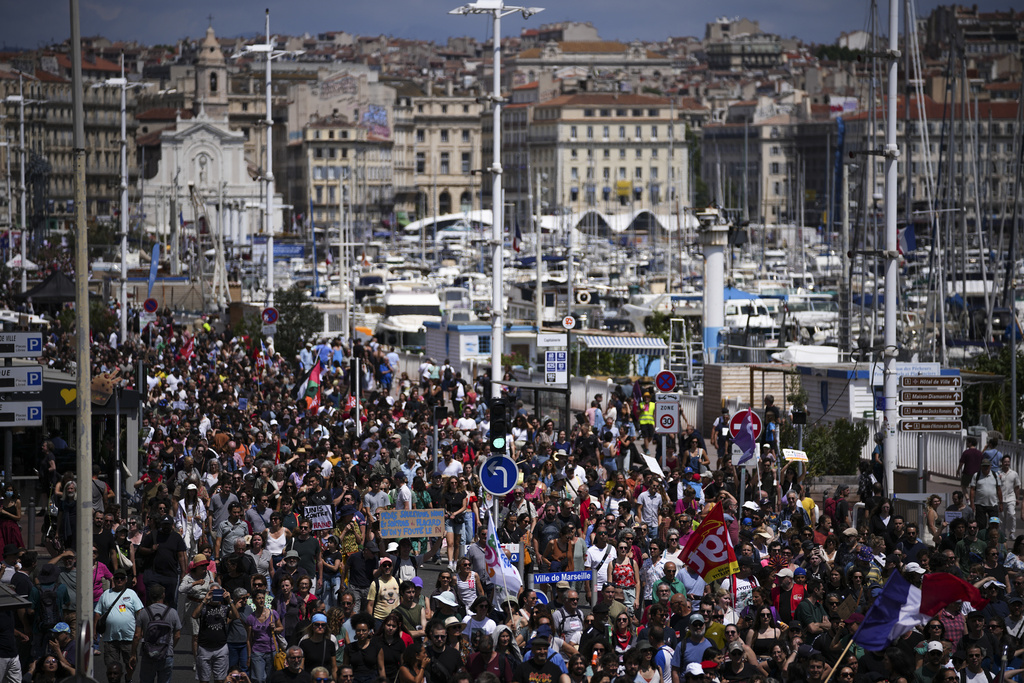From Paris to Marseille, thousands of people – mostly women, but many men too – demonstrated today calling for a universal framework law to tackle violence against women.
“The more we are, the more we will be visible, it’s an issue that affects everyone, not just women,” said Peggy Plou, who took part in the Paris demonstration along with tens of thousands of people – 80,000 according to organizers.
In Marseille, in southern France, around 800 people, mostly young people, gathered in the Old Port to denounce sexist violence. “To break the law of silence, shame to change sides” and “No means no”, were written on the placards held by the protesters.
“I feel that it concerns me, all of us can play a role, especially men,” explained 38-year-old Arnaud Garchet, who participated with his two children in the mobilization. “We are the source of the problem and the source of the solutions as well,” he noted.
A little further away, a woman wore a badge where she had crossed out the phrase “Protect your daughters” and replaced it with the slogan “Educate your sons.”
Protesters have gathered all over France as demonstrations begin over violence against women as the #Metoo movement continues to grow following the Gisele Pelicot case.
Sky’s @SiobhanRobbins has the latest live from Paris.
📺 Sky 501 pic.twitter.com/rDS7WbS7ic
— Sky News (@SkyNews) November 23, 2024
The protests came two days before the International Day for the Elimination of Violence against Women, on Monday.
This year’s mobilization against all forms of violence (sexual, physical, psychological, economic…) is taking place in France under special circumstances, against the background of the trial of 50 men accused of raping 70-year-old Giselle Pelico for a decade after drugging her, without her knowledge. her husband. This case, which shocked the country and global public opinion, “shows that the culture of rape is rooted in society, as is violence against women,” said Amandine Cormier, of the “Feminist Strike” organization, at a press conference. which he recently granted. “Patriarchal violence is practiced everywhere, in homes, workplaces, study areas, on the road, in means of transport, in nursing institutions, everywhere in society,” he stressed.
The call for mobilization was signed by more than 400 organizations and personalities, including singers and actresses. “Successive governments have multiplied the promises but the means are insignificant and diminishing, the political action is almost non-existent” they said in their declaration calling for a “real leap”.
In November 2017, a few months after assuming the presidency, Emmanuel Macron declared that the first goal of his presidency would be to promote equality between men and women and the “total elimination of violence against women”. The measures taken (such as a telephone number for complaints by victims) were welcomed by women’s rights associations, although they were considered insufficient. They are asking for an amount of 2.6 billion to be invested. euros annually to combat violence and to pass a “single framework law” to replace the current, “fragmented and incomplete” legislation.
The deputy minister responsible for equality, Salima Saa, said earlier this month that she would announce “concrete and effective measures” on November 25.
Read also
Alarm in the West after the strike in Ukraine with the new Russian Oreshnik missile – NATO meets in emergency
Karamanlis broke the “silence” of a week – “Disciplinary measures make it difficult to support the national line”
Nikos Romanos: He was remanded in custody for a fingerprint on a mobile object – Episodes outside the court
Beware, if you travel with an airline and a discount, Pitsilis may accuse you of money laundering
Battle for artist degrees at the Council of Ministers – Professor Panos Lazaratos explains the importance of the first decision in Documentonews
!function(f,b,e,v,n,t,s)
{if(f.fbq)return;n=f.fbq=function(){n.callMethod?
n.callMethod.apply(n,arguments):n.queue.push(arguments)};
if(!f._fbq)f._fbq=n;n.push=n;n.loaded=!0;n.version=’2.0′;
n.queue=[];t=b.createElement(e);t.async=!0;
t.src=v;s=b.getElementsByTagName(e)[0];
s.parentNode.insertBefore(t,s)}(window, document,’script’,
‘
fbq(‘init’, ‘726515947549353’);
fbq(‘track’, ‘PageView’);
#France #Thousands #people #demonstrated #violence #women #country
**How does the “MeToo” movement intersect with the demand for a unified law against violence against women in France, and what are the potential limitations of relying solely on legal frameworks to address this issue?**
## World Today News: Interview on France’s Protests Against Violence Against Women
**Introduction:**
Welcome to World Today News. Today we’re discussing the large-scale protests taking place across France, with thousands demanding a comprehensive legal framework to tackle violence against women. We’re joined by two esteemed guests: Dr. Anne Dupont, a sociologist specializing in gender studies, and Mr. Pierre Martin, a legal expert focusing on women’s rights. Welcome to both of you.
**Section 1: The Scope of the Protests and The “MeToo” Movement**
* **Interviewer:** Dr. Dupont, tens of thousands marched across France today, not just women but men too. What does this widespread participation tell us about the current landscape regarding violence against women in France?
* **Dr. Dupont:** (Responds, providing insights into the significance of public mobilization and the potential reasons behind the wide participation, referencing the article’s context)
* **Interviewer:** Mr. Martin, the article mentions these protests come in the wake of the ”MeToo” movement and the shocking case of Giselle Pelicot. How has this case impacted the fight against violence against women in France?
* **Mr. Martin:** (Responds, analyzing the influence of the ”MeToo” movement and the Pelicot case on legal and societal perspectives, potentially drawing connections to the article’s mention of the trial and public reaction)
**Section 2: The Demand for a Unified Framework Law**
* **Interviewer:** Dr. Dupont, over 400 organizations have called for a “single framework law” to combat violence against women. What are the shortcomings of the current legislation, and how could such a law effectively address them?
* **Dr. Dupont:** (Explains the fragmentation of existing legislation and the potential benefits of a unified approach, referencing the article’s mention of “fragmented and incomplete” legislation and the demand for 2.6 billion euros annually)
* **Interviewer:** Mr. Martin, what are the legal challenges in implementing such a comprehensive law? What are the key elements that should be included to ensure its effectiveness?
* **Mr. Martin:** (Discusses potential legal hurdles, elaborates on essential components for a robust law, potentially referencing the article’s mention of “concrete and effective measures” promised by the government)
**Section 3: Role of Men and Societal Responsibility**
* **Interviewer:** Mr. Martin, the article quotes a protester saying that “men are the source of the problem and the source of the solutions.” How can men actively contribute to combating gender-based violence?
* **Mr. Martin:** (Discusses the importance of male allyship, potential strategies for engaging men in the fight against violence against women, and the need for a shift in societal norms)
* **Interviewer:** Dr. Dupont, the article highlights the slogan “Educate your sons.” How crucial is early education and societal upbringing in preventing violence against women?
* **Dr. Dupont:** (Explains the role of education, parental influence, and societal values in shaping attitudes towards gender equality and violence prevention)
**Conclusion:**
* **Interviewer:** Thank you both for sharing your valuable insights. This important discussion on violence against women highlights the urgent need for comprehensive legislative action and societal change. As the world watches France’s fight for proactive measures, we hope this raises awareness and encourages similar movements globally.

